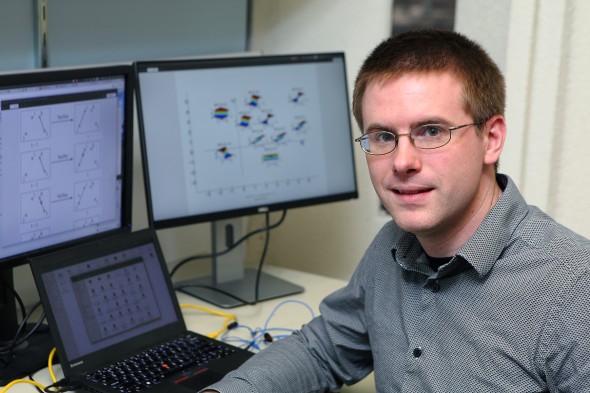Computer scientist honored with NSF CAREER award
Brian Ziebart, assistant professor of computer science, has received a $500,000 National Science Foundation CAREER award, the NSF’s top award for young researchers, to develop better structured prediction methods that could make autonomous vehicles safer and improve other applications in health care, financial market stability and safety.
Ziebart works in the field of adversarial machine learning and is using it to improve structured prediction tasks — tasks that require the joint prediction of many related variables, rather than independent predictions for separate variables. For example, an autonomous vehicle’s lane-change decision may depend on its estimates for position and velocity of nearby vehicles, its assessment of road conditions and other potential obstacles, and so on.
Such a vehicle, Ziebart said, is trying to generalize from limited previous experience for machine learning, similar to the way Amazon’s “Alexa” seeks to quickly learn its users’ intentions and preferences.
“One way to do it is to make worst-case assumptions about what you don’t know,” he said — a task for which generative adversarial networks are becoming popular.
“We use a lot of optimization methodology, including convex optimization,” he said. “And we use game theory to construct these prediction paths to make it efficient for real-time applications.”
In the case of computer vision for a self-driving vehicle, the machine learning utilizes context.
“If you have pixels, and you want to assign which ones are car-pixels, rather than looking at each one, you look at a wider area that defines what car-pixels should be,” he said. “The car-pixels will be near road-pixels, and this idea of leveraging structure happens at multiple levels.”
Ziebart received his undergraduate degree in computer engineering with highest honors from the University of Illinois at Urbana-Champaign. He earned a master’s degree in machine learning and his doctorate in knowledge discovery and data mining from Carnegie Mellon University. He did postdoctoral research in Carnegie Mellon’s Human-Computer Interaction Institute and Robotics Institute before joining the UIC computer science faculty in 2012.

